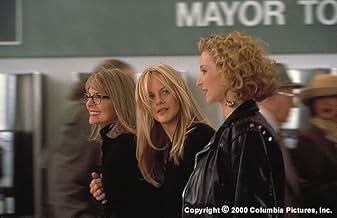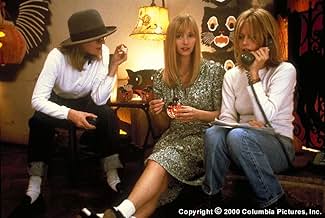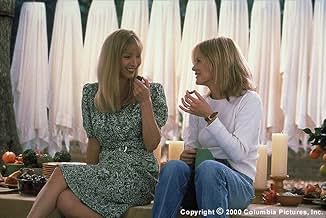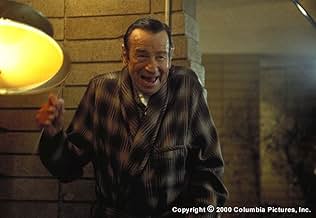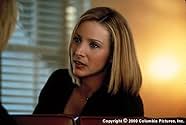A trio of sisters bond over their ambivalence toward the approaching death of their curmudgeonly father, to whom none of them was particularly close.A trio of sisters bond over their ambivalence toward the approaching death of their curmudgeonly father, to whom none of them was particularly close.A trio of sisters bond over their ambivalence toward the approaching death of their curmudgeonly father, to whom none of them was particularly close.
- Awards
- 2 wins & 1 nomination
Shaun Duke
- Omar Kunundar
- (as Duke Moosekian)
Libby Hudson Lydecker
- Georgia's Assistant
- (as Libby Hudson)
Storyline
Did you know
- TriviaWalter Matthau's final role. In very poor health throughout filming, he suffered from several cardiovascular problems, and had more than two heart attacks since his first in 1965. He died over seven months later, four months after the film's release.
- GoofsThere is no second floor to the Richard M. Nixon Library in Yorba Linda, California.
- Quotes
Lou Mozell: You know, that I actually met a girl by the name of Moo Goo Gai Pan? That was her last name. Her first name was Freida. Freida Moo Goo Gai Pan. She was half-Jewish, half-Chinese. A lot of people called her the Ori-Yenta.
- Alternate versionsA flashback scene set in a New York City Chinese restaurant in the early 1990s where the sisters have a dinner with their father that ends in disaster was filmed, but ultimately cut from the final film.
- SoundtracksOnce Upon A Time
Music by Charles Strouse
Lyrics by Lee Adams
Performed by Jay McShann
Courtesy of Sackville Records
Featured review
I rented this movie (`Hanging Up') and I found it devastatingly effective.
At the center of the movie is Meg Ryan, whose movies I've not seen a lot. Her character, Eve, is really the fulcrum on which the whole movie balances. Much as her character's car is boxed in by a parking-garage accident early in the movie, I got the feeling that the movie was a meditation on whether her life is of her own choosing and making, or whether it is something she has largely been trapped into.
Part of the art of the movie is, I feel, that the character doesn't really know. This isn't made explicit in dialogue - rather, you can see it in her face as she repeatedly goes through situations in her life. And in her reactions to those situations, you can see the many little waves of emotion sweeping over her, all vying for the upper hand. It's as if she's perpetually trying to find her place and regain her balance.
And this may be what some people who saw the movie and didn't like it don't see: at times, you wonder if she's really going to crack. An example is the brilliantly conceived set of characters represented by Eve's mother (in a brief appearance by Cloris Leachman) and Eve's husband (who has slightly more screen time). Each very clearly rejects Eve's father. But, in doing so, each of them places, perhaps unwittingly, a huge demand on her. For Eve, to live in the world that is dictated by others' expectations and reactions, whether reasonable or unreasonable, is to deny herself. And yet, the paradox is that, while her continued interactions with her father and sisters represent a possibly destructive degree of self-denial, in all the caring she dispenses to others, she is her best self. Her use of the phone is the clear metaphor for that she can't stand to stay on it, and yet she can't stand to stay off of it.
Diane Keaton's direction is very impressive in the movie, in my opinion. The staging and editing are first rate, and really frame the story beautifully. Her acting performance in the film is a little awkward, but her ability as a director to really get the actors to play with a subtlety and spontaneity in their reactions to each other (particularly in scenes between Meg Ryan and Lisa Kudrow) is very skilled.
I think that if a viewer sees the movie as just a light comedy or a succession of gags, they have really missed the point of what Diane Keaton is trying to do. I find that hard to fathom, because Meg Ryan's central performance clearly is meant to showcase the character's essential emotional confusion, and I feel like the direction emphasizes this repeatedly. Maybe some viewers are distracted by Meg Ryan's beauty, which may have had the effect of setting up some distance between themselves and the character. It could be argued that Keaton allowed Ryan to be so well dressed, often in extremely flattering outfits of pastel colors, that it's hard to take seriously that the character could be an emotional mess. Eve may have inadvertently been robbed of some of the character's gravitas as a result.
I see a lot of darkness in Walter Matthau's character as well, but the affection between him and the Meg Ryan character is also very clear. Adam Arkin contributes a fine supporting performance in the movie as Eve's husband. His character could have easily been so blandly cast that it would have sunk right into the background, but he is a confrontational, yet gentle, force in Eve's life, and helps call the question as to whether Eve's life is in the state it's in by her own choice or not.
So, to sum up, I think that to dismiss `Hanging Up' as a heartwarming bauble is to miss a lot. The central character is a woman that is pulled and tugged in so many directions, all in the midst of a life that looks deceptively normal given her stresses, but is really one that remains hers to define. By the end of the movie, you can see in Ryan's expressions (and judge for yourself) the degree to which she has, or has not, come to a level of acceptance about her lot.
At the center of the movie is Meg Ryan, whose movies I've not seen a lot. Her character, Eve, is really the fulcrum on which the whole movie balances. Much as her character's car is boxed in by a parking-garage accident early in the movie, I got the feeling that the movie was a meditation on whether her life is of her own choosing and making, or whether it is something she has largely been trapped into.
Part of the art of the movie is, I feel, that the character doesn't really know. This isn't made explicit in dialogue - rather, you can see it in her face as she repeatedly goes through situations in her life. And in her reactions to those situations, you can see the many little waves of emotion sweeping over her, all vying for the upper hand. It's as if she's perpetually trying to find her place and regain her balance.
And this may be what some people who saw the movie and didn't like it don't see: at times, you wonder if she's really going to crack. An example is the brilliantly conceived set of characters represented by Eve's mother (in a brief appearance by Cloris Leachman) and Eve's husband (who has slightly more screen time). Each very clearly rejects Eve's father. But, in doing so, each of them places, perhaps unwittingly, a huge demand on her. For Eve, to live in the world that is dictated by others' expectations and reactions, whether reasonable or unreasonable, is to deny herself. And yet, the paradox is that, while her continued interactions with her father and sisters represent a possibly destructive degree of self-denial, in all the caring she dispenses to others, she is her best self. Her use of the phone is the clear metaphor for that she can't stand to stay on it, and yet she can't stand to stay off of it.
Diane Keaton's direction is very impressive in the movie, in my opinion. The staging and editing are first rate, and really frame the story beautifully. Her acting performance in the film is a little awkward, but her ability as a director to really get the actors to play with a subtlety and spontaneity in their reactions to each other (particularly in scenes between Meg Ryan and Lisa Kudrow) is very skilled.
I think that if a viewer sees the movie as just a light comedy or a succession of gags, they have really missed the point of what Diane Keaton is trying to do. I find that hard to fathom, because Meg Ryan's central performance clearly is meant to showcase the character's essential emotional confusion, and I feel like the direction emphasizes this repeatedly. Maybe some viewers are distracted by Meg Ryan's beauty, which may have had the effect of setting up some distance between themselves and the character. It could be argued that Keaton allowed Ryan to be so well dressed, often in extremely flattering outfits of pastel colors, that it's hard to take seriously that the character could be an emotional mess. Eve may have inadvertently been robbed of some of the character's gravitas as a result.
I see a lot of darkness in Walter Matthau's character as well, but the affection between him and the Meg Ryan character is also very clear. Adam Arkin contributes a fine supporting performance in the movie as Eve's husband. His character could have easily been so blandly cast that it would have sunk right into the background, but he is a confrontational, yet gentle, force in Eve's life, and helps call the question as to whether Eve's life is in the state it's in by her own choice or not.
So, to sum up, I think that to dismiss `Hanging Up' as a heartwarming bauble is to miss a lot. The central character is a woman that is pulled and tugged in so many directions, all in the midst of a life that looks deceptively normal given her stresses, but is really one that remains hers to define. By the end of the movie, you can see in Ryan's expressions (and judge for yourself) the degree to which she has, or has not, come to a level of acceptance about her lot.
Everything New on Hulu in November
Everything New on Hulu in November
There's a whole lot to love about Hulu's streaming offerings this month — get excited for brand-new series premieres and film favorites to watch at home.
Details
- Release date
- Countries of origin
- Language
- Also known as
- No nos dejes colgadas
- Filming locations
- Production companies
- See more company credits at IMDbPro
Box office
- Budget
- $60,000,000 (estimated)
- Gross US & Canada
- $36,050,230
- Opening weekend US & Canada
- $13,567,978
- Feb 20, 2000
- Gross worldwide
- $51,880,044
- Runtime1 hour 34 minutes
- Color
- Sound mix
- Aspect ratio
- 1.85 : 1
Contribute to this page
Suggest an edit or add missing content



